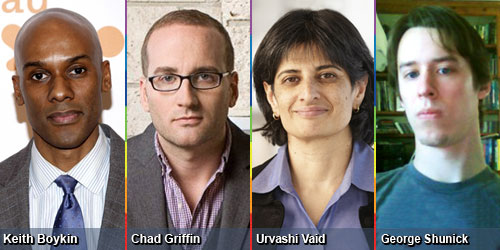Compiled by Howard Israel

S/he Said
"No one would say that growing up LGBT is easy, but this survey is a stark wake-up call to the daily toll that discrimination takes on vulnerable young people. We have a responsibility to change that, because we know all too well that there are real life consequences to inaction."
-Chad Griffin, the new HRC President, in a press release titled "HRC Releases Landmark Survey of LGBT Youth," about the groundbreaking Human Rights Campaign study of LGBT-identified young people titled "Growing Up LGBT in America" and a corollary study of straight teens that shows tremendous disparities between the two groups, with more than 10,000 respondents ages 13-17, http://www.hrc.org, June 07.
Read the full article here
"What's so wrong with gays in comics? Are gays somehow incapable of heroism? I suppose if you believed being gay is somehow, in and of itself, immoral then you may think that. Comics have bigger issues to concern themselves with than reactionary, gay-baiting Christian housewives. In reality – and good writing – sexuality is a component of a character, but it does not solely define them. A superhero is no more virtuous than a superheroine, just because one has boobs. And a gay superhero isn't somehow less virtuous just because they like dudes. In comics, being gay, just like being female or a minority, is an ancillary quality that fleshes out a character and helps give them a distinguishing identity. It allows them to connect to readers who are women or gays, who desire to relate to a character that seems to embody some aspect of what they are. Gay superheroes help appeal to a gay audience, they don't brainwash straight kids into being gay. Just like in real life, homosexuality is not an impediment to virtue, selflessness, or any other quality that makes superheroes 'super.' "
-George Shunick, in his column titled "Sexuality & Superheros: One Million Moms vs. Gays in Comics," about One Million Moms, an offshoot of the American Family Association, and their condemnation of DC Comics and Marvel Comics for introducing gay characters and same-sex marriage into their popular comic book titles, http://www.policymic.com, May 22.
Read the full article here
"Today's mainstream LGBT movement is strangely silent on the broader social-justice challenges facing the world, oddly complacent in its acceptance of racial, gender, and economic inequalities, and vocal only in its challenge to the conditions facing a white, middle-class conception of the 'status queer.' This impoverishment of ambition and idealism is a strategic error. It misunderstands the challenge queer people pose to the status quo. It shamefully avoids the responsibility that a queer movement must take to advocate for all segments of LGBT communities. And it is deluded in its belief that legal, deeply symbolic acts of recognition – like admission into traditional institutions such as marriage – are actually acts of transformation that will end the rejection and marginalization of LGBT people. Without a broader definition of equality, the LGBT politics currently pursued will yield only a conditional equality, one that will always be contingent upon 'good behavior.' "
-Urvashi Vaid, director of the Engaging Tradition Project at Columbia Law School's Center for Gender and Sexuality Law, in her article titled "Still Ain't Satisfied: The Limits of Equality," http://prospect.org, April 30.
Read the full article here
"… in 2003… the Massachusetts Supreme Judicial Court issued its groundbreaking decision making it the first state to allow same-sex marriage. The decision prompted outrage from critics, including some vocal black ministers. Suddenly, black gays and lesbians were under attack within their own community on an issue they hadn't necessarily chosen. But they began to organize to fight back. Now we're starting to see the fruit of their labor. Long before President Obama's announcement on marriage equality, LGBT people of color were laying the groundwork for broader support in their own communities. They were coming out, getting married, challenging their churches, defining their own identities, and creating institutions to support and sustain them. Those actions helped to make it easier for heterosexual African Americans to see same-gender-loving couples and individuals in a new light. So it's not surprising that virtually every prominent African American, except for a few vocal preachers, has come out in support of the president's position in recent weeks."
-Keith Boykin, in his column titled "Why Blacks Evolved So 'Quickly' on Gay Marriage," http://www.huffingtonpost.com, June 05.
Read the full article here










